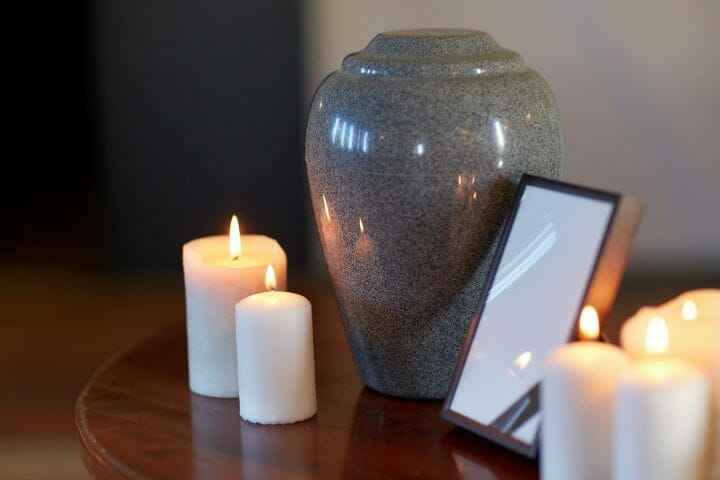You are probably reading this because you are thinking about your final arrangements. Or perhaps you want to help a family member with their pre-planning needs. In either case, you are at the right place.
Here I’ll cover the five tips that I always offer my senior clients when we discuss pre-planning their funeral arrangements. After reading this article, you’ll know exactly how to pre-plan your funeral effectively.
So let’s get started!
Contents
Tip #1 – Choose Between Burial and Cremation
No one wants to think about dying. Unfortunately, it seems like many people prefer to avoid the subject altogether and would rather let their children deal with it.
But the truth of the matter is, the decision should be yours and yours alone.
Before anything else, you will have to decide whether you want to be buried or cremated. Here’s some information that might help you decide between these two options:
Option #1 – Burial
Depending on where you live, a burial can typically cost anywhere between $8,000 and $10,000. This amount can be higher if you live in an expensive area. And that’s not all. You must also take into consideration additional costs for transportation, embalming, use of the funeral home for the viewing, ceremony, and a casket, for example.
Option #2 – Cremation
Cremation is a much cheaper option than burial. In fact, you might be surprised to discover that cremation costs are often half of those of traditional style burials. And they can be even lower if you choose “direct cremation” with no funeral service and no ceremony.
Most people today tend to choose cremation as a much simpler alternative.
You may also like What Should Seniors Without Partners Do
Tip #2 – Talk with Multiple Funeral Homes
Once you’ve decided whether you want to be buried or cremated, you need to plan all the details and find the best deal. This way, you’ll get to know the exact costs, what to expect, and you can sort out all the details with your family in advance.
I suggest talking to as many different funeral homes as you can, at least two or three of them, unless you have a long-standing relationship with a particular funeral home. This should not be a problem as even the smallest towns usually have multiple funeral homes.
Tip #3 – Get Everything in Writing
Funeral homes can help you have all the details in writing. There are at least two benefits to this:
Benefit #1 – On Record
When everything is laid out clearly in writing, your family is more likely to respect your wishes.
Benefit #2 – Less Emotional Burden
Many people avoid communicating in writing how they’d prefer their loved ones to “say goodbye.” But remember that your family members won’t be responsible for deciding everything after you pass away. To make things easier for them in those difficult moments, you should get everything you want down in writing as early on as possible.
You may also like How Do Elderly React to Death of Their Significant Other
Tip #4 – Decide How You Are Going to Pay
I’ve helped countless seniors take care of their final expenses and my advice is to start putting a payment plan together as soon as you can. It’s best to plan ahead of time to make your passing easier on your family, at least when it comes to finances.
Of course, if you’ve got the cash on hand and feel comfortable making a large investment, you can approach a funeral home directly and pay for your final expenses upfront.
However, if you can’t afford or don’t want to put a large sum of money down, there are two other options: the final expense life insurance plan and the pre-need insurance plan.
Option #1 – Final Expense Life Insurance Plan
The final expense life insurance plan is also known as a burial insurance plan. This option will cost you around $25 to $100 a month, and the plan can be custom-tailored to suit your budget and needs.
In addition, your beneficiary will receive a lump sum benefit to pay for your funeral arrangements. Some life insurance companies will allow you to assign a funeral home as the beneficiary as well.
Option #2 – Pre-Need Insurance Plan
Pre-need insurance plans are sold directly by funeral homes. They are more expensive than the final expense life insurance plans. Typically, their cost is around $150-$200 a month. You need to make payments for a number of years, and if you die earlier, your plan will cover some, if not all, of your burial costs.
You may also like Do the Elderly Know When They Are Dying?
Tip #5 – Have an Open Discussion with Your Family
This is often the hardest part for most families. That’s perfectly normal. It’s difficult to talk about dying with the people you love. To make things easier, I recommend you consider leaving this step for the very end, after you’ve already finished all the pre-planning. This way, you’ll know exactly what you want to tell your loved ones.
Your funeral is about you and how you wish to be remembered during the service. However, keep in mind that it’s also an opportunity for your family to say goodbye. They are the ones who will be partially responsible for organizing your funeral service after you pass. That’s why it’s essential to take into consideration their feelings and their needs as well.
I hope these tips have helped!
Thank you so much for reading.
Other article of interest




